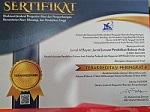Abu al-‘Atahiyyah's Perspective on Religious Moderation in Arabic Poetry
Abstract
A.Teeuw stated that human being have at least four paths to understanding reality and truth: religion, science, philosophy, and art. Literature is distinct from three other truths as art. Literature can go beyond dogma, science, and philosophy. Poets can continue to be creative and imaginative, offering unrestricted thinking as long as their language moves the reader's emotions in accordance with truth fiction. This article attempted moderation with the four indicators of religious moderation developed by the Ministry of Religious Affairs of the Republic of Indonesia which based on Abu al-'Atahiyyah perspective about religious moderation which were extracted from his poetry anthology with the note-taking technique. Afterwards, it was analyzed with a pragmatic approach in literary studies. The findings of this study indicated that Abu al-‘Atahiyyah also discussed the religious moderation in terms of tolerance, nonviolence, and accommodating local culture. As a result, this article demonstrated that the concepts of truth can also be found in literary works.
Keywords
Full Text:
PDFReferences
Ahmad, Ghulam, Muhammad Sarwar, and Makkiah Nabi Bakhsh. “A Study of the Manifestation of Spirituality and Amelioration of Society in English Translation of Abu Ishaq Isma’il’s Ascetical Poetry.” PalArch’s Journal of Archaeology of Egypt/Egyptology 20, no. 1 (2023): 1316–1329.
Al-Akkawi. al-Mujaz fi al-Adab al-Arab wa Tarikhi al-Adab al-Islami. Cairo: Dar Ma’arif, 1962.
Al-Iskandari, Ahmad. Al-Wasith Fi al-Adab al-’Arabiy Wa Tarikhihi. Cairo: Mathba’ah al-Ma’arif, 1934.
Al-Maqdisi, Anis. Umara’ as-Syi’r Fi al-Ashr al-’Abbasiy. Beirut: Dar al-’Ilm al-Malayin, 1989.
Alharthi, Jokha. The Body in Arabic Love Poetry: The Udhri Tradition. Edinburgh University Press, 2021.
“An Interview about ‘In Defense of Religious Moderation’ | Stanford Humanities Center,” November 26, 2010. https://shc.stanford.edu/arcade/interventions/interview-about-defense-religious-moderation.
Ardhianta, Shidiq. “Moderate Islam in Literary Texts by KH. Mustofa Bisri and its Relevance as Teaching Materials at SMAN 4 Jember.” Cllient (Culture, Literature, Linguistics, and English Teaching) 4, no. 1 (2022): 1–16.
Al-Atahiyyah, Abu. Diwan Abi Al-’Atahiyyah. Lebanon: Beirut, 1986.
Bakir, Muhamadul, and Khatijah Othman. “Wasatiyyah (Islamic Moderation): A Conceptual Analysis from Islamic Knowledge Management Perspective.” Journal of Islamic Thought and Civilization 7, no. 1 (2017): 13–30.
Basyar, Kamal. Ilmu al-Lughah al-’Ijtima’iy al-Qahirah. Cairo: Dar Gharib, 1997.
Beeston, Alfred Fl. Arabic Literature to the End of the Umayyad Period: the Cambridge History of Arabic Literature. Cambridge: Cambridge University Press, 1983.
Corbett, Rosemary R. “Moderation in American Religion.” Oxford Research Encyclopedia of Religion (2017).
Daud, Muhammad. Al-’Arabiyah Wa ’Ilmu al-Lughah al-Hadits. Cairo: Dar Gharib, 2001.
Egginton, William. In Defense of Religious Moderation. Columbia University Press, 2011.
Fananie, Zainuddin. Telaah Sastra. Surakarta: Muhammadiyah University Press, 2001.
Fariq, Khurshid A. “The Poetry of Aban Al-Lahiqi.” Journal of the Royal Asiatic Society of Great Britain and Ireland 84, no. 1-2 (1952): 46–59.
Hanapi, Mohd Shukri. “The Wasatiyyah (Moderation) Concept in Islamic Epistemology: A Case Study of its Implementation in Malaysia.” International Journal of Humanities and Social Science 4, no. 9 (2014): 51-62.
Hasan, Kamaruddin, and Hamdan Juhannis. “Religious Education and Moderation: A Bibliometric Analysis.” Cogent Education 11, no. 1 (2024): 1-15.
Hassan, Muhammad Haniff. “Wasatiyyah as Explained by Prof. Muhammad Kamal Hassan: Justice, Excellence and Balance.” Counter Terrorist Trends and Analyses 6, no. 2 (2014): 24–30.
Hisamuddin, Karim Zaki. al-Lughah wa at-Tsaqafah: Dirasah Antrulughawiyyah li Alfadz wa 'Alaqat al-Qarabah fi at-Tsaqafah al-’Arabiyyah. Cairo: Maktabah al-Anjlu al-Mishriyyah, 1990.
Ibrahim, Mazlan, Jaffary Awang, Latifah Abdul Majid, Haziyah Husin, M. N. A. Kadir, and A. H. Usman. “Wasatiyyah Discourse According to Muslim Scholars in Malaysia.” Advances in Natural and Applied Sciences 7, no. 1 (2013): 6-14.
Kafrawy, Muhammad. A Critical Study of the Poetry of Isma’il b Al-Qasim Known as Abu al-’Atahiya. Dissertation: University of London, 1951.
Kamali, Mohammad Hashim. The Middle Path of Moderation in Islam: The Qur’anic Principle of Wasatiyyah. Oxford University Press, 2015.
Mudhar, Yuuns Ali, and Bey Arifin. Sejarah Kesustraan Arab. Surabya: Bina Ilmu, 1983.
Nafisah, Nahdia Ilma. “Religious Moderation Represented through Rumi’s Thought in The Masnavi.” Journal of Literature, Linguistics, & Cultural Studies 1, no. 1 (2022): 323–338.
RI, Tim Penyusun Kementrian Agama. Moderasi Beragama. Jakarta: Badan Litbang dan Diklat Kementerian Agama RI, 2019.
Sanneh, Lamin. “Religion and Politics: Third World Perspectives on a Comparative Religious Theme.” Daedalus 120, no. 3 (1991): 203–218.
Sugihastuti, Saptiawan and Itsna Hadi. Gender & Inferioritas Perempuan: Praktik Kritik Sastra Feminis. Yogyakarta: Pustaka Pelajar, 2007.
Syaib, Ahmad. Ushul An-Naqdu al-Adabi. Cairo: Maktabah an-Nahdotu al-Misriyyah, 1994.
Taufik, Zulfan, and Muhammad Taufik. “Mainstreaming Religious Moderation Through Islamic Literature.” KnE Social Sciences (2022): 660–669.
Teeuw, A. Sastra dan Ilmu Sastra: Pengantar Teori Sastra. Bandung: Pustaka Jaya, 1984.
DOI: http://dx.doi.org/10.24042/albayan.v16i1.22026
Refbacks
- There are currently no refbacks.
Copyright (c) 2024 Jurnal Al Bayan: Jurnal Jurusan Pendidikan Bahasa Arab
License URL: https://creativecommons.org/licenses/by-nc-sa/4.0
Editorial Office:
Jurnal Al Bayan: Jurnal Jurusan Pendidikan Bahasa Arab, Arabic Education Study Program, Faculty of Education and Teachers Training, Unversitas Islam Negeri Raden Intan Lampung
Jl. Endro Suratmin 1 Sukarame, Bandar Lampung 35131-Indonesia
e-mail: jurnalalbayan@radenintan.ac.id
http://ejournal.radenintan.ac.id/index.php/albayan/index
Jurnal Al Bayan: Jurnal Jurusan Pendidikan Bahasa Arab is licensed under a Creative Commons Attribution-ShareAlike 4.0 International License. p-ISSN 2086-9282 | e-ISSN 2549-1229









